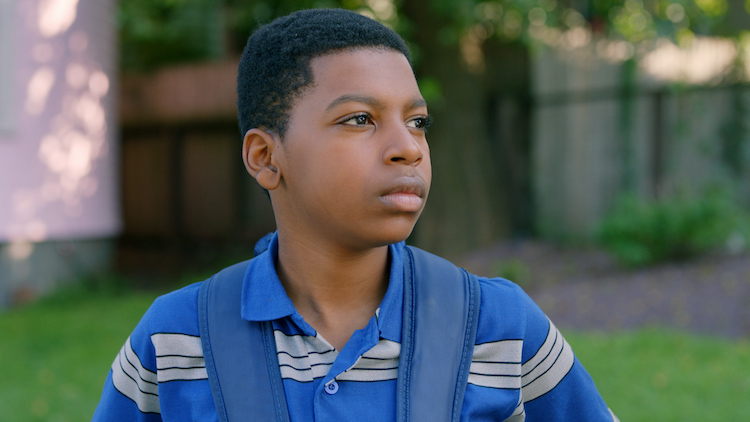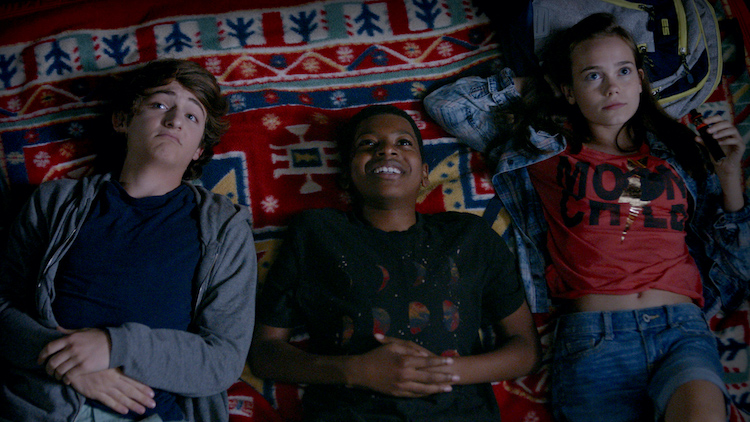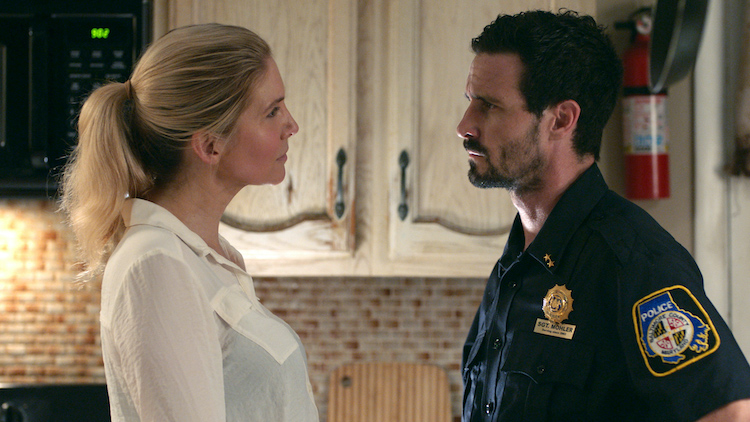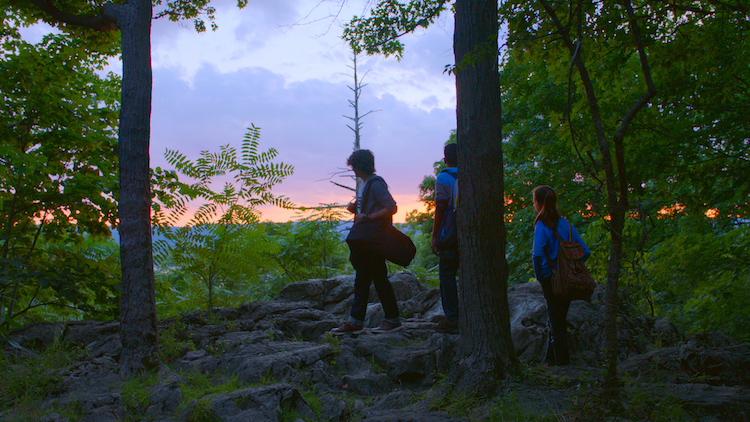Hey everyone. Happy Thanksgiving to those in the world who celebrate it. Barbarella here, and I have to say that there’s something so refreshing about speaking with someone whose enthusiasm just bubbles over, and writer/director Ben Hickernell is one such person. I had a lengthy conversation with him about his film WHAT WE FOUND, which can currently be seen On Demand and Digital. A group of incoming freshmen at a tough public high school become embroiled in a mystery when their friend Cassie disappears in West Baltimore. The film stars Elizabeth Mitchell (LOST, FREQUENCY), Oona Laurence (PETE’S DRAGON), James Ransone (SINISTER, GENERATION KILL), and newcomer Jordan Hall. Right off the bat, I wanted to know all about this new young talent, so that’s where I started my questions.
I would love to know all about Jordan Hall, who plays Marcus. Where did you find him? How old is he? What’s he like on set?
“Yeah, I think his performance is a really cool breakthrough performance, so I'm glad you're asking. I think it has been a weird year for gaining media attention. I'm happy to talk about it, because yeah, I'd love for his name to get out there even more. This is his first film. Jordan’s a New York kid. When we shot, he was 14 years old, and he had been a Broadway theater kid. He was young Simba in the Lion King, I think, on and off Broadway. I think he might've been in a production of Matilda. Basically, he was this kid who loved musical theater. [He] has an amazing voice. There was nothing about Marcus singing the script, but in the edit room, I was like, "Damnit, I should have written one little moment where you just hear this kid, maybe some private moments in his bedroom or something, ‘cause his voice is amazing.” But, that was the actor, not the character.

“Basically, we did a long search for Marcus. I grew up in Baltimore. It’s, obviously, a majority black city. It just really felt right to have this character be black. So that was from day one on the page, but that also meant it was a little harder to find talent just because of the fact that those opportunities aren't as prevalent for young black kids. Basically, when we were auditioning for Holly, the young white girl lead, we got thousands of submissions because there are a lot of young girls whose families can support a young girl going out and trying to do this for a career, but it was hard to find a Marcus. We didn't have that many options. So, we just kept pushing.
"We looked at our usual rounds of some kids who’d done TV, and some of them were great but were booked. Some of them weren't right. In the end, we found Jordan, who was one of the four finalists from the third round of tapes. Then I had interviews with the actors, and the one thing about Jordan was he'd never done film, which can be an exciting thing, but it can also be a steep learning curve. [We already had] Elizabeth Mitchell, who has done bunch of series and films, and James Ransone, who's a great indie-film actor, so I needed to make sure he'd hold his own.
“We had this interview on Skype, and I pushed him, and I kind of needled a little bit, just making sure he was up to the challenge. He convinced me that he was. We did a second audition, and he made great adjustments and really seemed ready to take it on.
“Basically, on set he was great. It was funny, in one of the interviews Elizabeth did, she said, "You'd never know that he was the star of the film. He was so relaxed.” I think that's true. I think he didn't quite know, in a good way, the gravity of [it all]. The shoot for the film was eighteen days and this poor kid worked almost every day. We did follow child labor laws, but this kid was in almost every scene. Sure, it was a lot, but he went into it with this excitement.
“I think he and I worked well together, and I taught him how the process worked as we went. Definitely had to push him sometimes to get some moments out. One big moment is that kitchen scene, the scene where he breaks down and cries. We spent more time on that than on some of the action beats. When you're doing these films, you have to really be efficient with your time management, but that scene was so important that Yetide Badaki, who plays his mother, and I just kept working with him in the scene and pushing him to really just open up and let that moment feel true and bring some of his own life experiences to it.
“Then it just clicked, and he started crying, and it was just there, and it was wonderful. The DP was great. I give credit to him ‘cause we were doing two different lens lengths, and we only had one camera. During that take, that was the wider setup. We were going to go to close-ups next, but the DP just felt it, and right at this key moment, the DP picks up the apple box [on which he was sitting] and just moves it three feet closer to basically get that close-up with the wider lens, because he knew this was the moment, and we weren't going to miss it. That’s what's in the film. So yeah, Jordan was great. A lot of people do respond to him and really think he just seems real. What did you think from the film?”
He’s great, and I'm happy that you chose to cast young kids playing young kids because a lot of times people cast older.
“Yes. And I'll take some credit for that ‘cause I am the director, and that was my approach, but also I got to credit Barbara McCarthy and Alice Merlin, who were the casting directors, 'cause we had that conversation early on. With the labor laws, it’s so much easier to cast a 17 or 18-year old because there are less restrictions. But for me, two of the touchstones for this movie were STAND BY ME and THE WIRE. In both cases, when they did kids, they cast age-appropriate kids, and it just makes such a difference. This movie is about a key moment in a person's life where they're kind of growing up, and they're not an adult yet.

“Part of the message of the movie is what it's like to get to that moment in your life, where you need to stand for something, and that's part of what Marcus’ journey is. He says, "I cared about Cassie, about this girl. She was nice to me. She stood up for me when nobody else would, so I'm going to stand up for her." Even though he's a 14-year-old kid, that act of standing up is important. And so, yeah, it was important to cast real kids. When we shot, Jordan and Oona, who played Holly, were 14 and Julian, who played Grant, had just turned 15. [There were] no 18-year-old kids or 22-year olds trying to pass off as 14-year-old kids."
I appreciate that. Who's easier to direct, the younger or the older cast members?
“It depends every time, I've found. This is my fourth feature, and my third one that I've written and directed, so I've worked with all kinds of actors. It's really funny how much some can be very emotion-based and intuitive-based, where they really don't want specific directions. You really have to just help guide, ask the right questions to trigger something in them, but they need to really be organic and discover it. And the other actors who are old pros, who were just smoking a cigarette like, "What do you want, kid?" And I'm like, "I just want you to do this." And they're like, "I got you." And they just do it.
“And this movie, I think the nice thing about it was, it was a very positive, collaborative environment, and that was led from the top down in the cast. Jordan was new. He was the lead, but in terms of the mood on set, Elizabeth Mitchell was such a giving, kind person. Her main goal in every scene was really, I think, to give to her scene partner, and so she set that tone. James Ransone has done so many indie films. He's all about integrity. He just shows up and does the scene. He's very efficient though. He's just so, "Let's just get it done." Elizabeth is more like, "Oh, let's try and think and talk about it." And then Oona, who plays Holly, is actually an established actress. She was Jake Gyllenhaal's daughter in SOUTHPAW. And she was in PETE’S DRAGON with Robert Redford. She was actually, in some ways, almost the most professional.”

What inspired the story?
“That's an easy and interesting one. Basically, I've done character dramas before. I wanted to lean into genre a bit on this film. It’s just the next thing in my career. When the podcast “Serial” came out in 2015, hundreds of thousands of people listened to it, got hooked on it, and got hooked on this mystery. I grew up five miles from Woodlawn High School, which is where the actual real-life events took place. It’s basically about a similar [situation].
“I'm not telling that story, but because I grew up there, I really had this experience listening to it of what it would have been like if that kind of event had happened to my friends and me. It really became this amalgamation of a coming-of-age story based on me and my friends wrapped into this mystery. The events, I thought, would really draw people in and give weight to the themes of discovering who you are and standing up for what's right. It was supposed to be a combination of [that] and a lot of stuff that comes from my life. We were definitely some of the nerdier type kids. I was bullied a lot when I was in middle and high school. We definitely went out in the woods to get peace from our parents and the pressures of high school.”
“As I wrote it, the nice thing was that I had this genre frame to put it inside, but it was the personal moments that, as a filmmaker, really got me going, like the kitchen scene. And then also, when I was writing it, there obviously were lots of pressures with the police and the state of police in their community in America. [I included] the storyline of Elizabeth Mitchell being the first female police captain of her district, the pressure she's feeling from the officers who are kind of pushing up and being like, "Why did she get the job?"”
How long did it take you to write this?
“I’m a working filmmaker, meaning I'm a working-class filmmaker. I'm not doing a hundred-million-dollar movie, so I'm doing other gigs, and sometimes it's a struggle to get each movie funded and made, a fun struggle, in some ways, but it's definitely a lot of work. So, the point is each movie I write [takes] six months, a year, but then there's this next year in the indie-filmmaking process of trying to get the freaking thing to happen, which involves fundraising and development and casting. I always work on the script during that. One nice thing is, as I face the pressures of trying to raise the right amount of money to do it properly, to get the right level of cast to get the movie made, it makes me keep reevaluating the script. And, as you get comments back from agencies or actors, or even just writer friends or whoever, I just keep refining, basically, until we shoot, so…yeah.”
You wore a lot of hats in this: writer, producer, director, editor. What was your favorite and least favorite of those roles?
“Other producers worked on the film, and they're great, so I'm not taking credit away from them. When I say, “producer,” it's not like I put it on the letterhead. I'm there doing contracts and negotiations and all kinds of shit. I found half of the locations. That's just indie film. I'm doing all this stuff during the making of the movie, which is crazy. Although producing is really important, I think it’s my least favorite. It's just that it's very distracting. When you're the director and producer, the tough thing is that so often when we're getting ready to shoot, I wanted to be working on the script or spending more time with the actors, chatting about the character. Instead, I'm having to deal with replacing this crew member, or this location fell through. That's the frustrating part.
“I think writing is almost the most important of the jobs because that's where it all begins, and when you're out fundraising and making the project happen, it's all based on that script and that story. But, it's really hard and boring and frustrating. Writing is a lot of you in your sweat pants at your house, banging your head against the wall.

“My favorite is directing, because directing is wonderful. As a director, you try to be there early and stay late. If something needs to get moved, I'll help the PA’s move the branches out of the way or whatever. I try to lead by example. I like that. It's very active. It's very collaborative and it's exciting. That's the part I enjoyed the most. Yeah.”
Every film seems to run into unexpected obstacles. What obstacles did you encounter while making WHAT WE FOUND, and how did you get past or work around them?
“Oh, man. This was an ambitious movie. It always was. Originally, we wanted to do it for a certain budget on a five-week schedule, and as we got closer and closer to shooting it, we just could not. We had some funding things happen. Basically, we had to end up doing the movie on a three-week schedule for less money than originally planned. That was a real challenge. Most of the shoot days were 10 hours because we had minors on set. We were racing every day to get things done. Really, it only worked out because the cast and crew were so dedicated and they just made it happen.
“I literally did the three things you're not supposed to do: minors, water, [and animals.] With minors, you can only shoot a certain number of hours per day. We've all heard the WATERWORLD stories; the reason it's doubled in budget is that shooting in water is nearly impossible. I don't know how scary the river scene seemed. I think some shots don't look as scary because it's on camera and from far away, but in real life, that kid could not stand without being swept away. It was pretty intense. And then we even had a freaking dog in the scene. That poor dog did her job wonderfully.
“The camera lighting department was fantastic because they let their ego get out of the way. Every camera person wants a scene to be lit impeccably and beautifully. I think this movie looks great, but all that lighting was done snap quick. They had a fogger, and for one of the woods scenes, they’d get the fogger out and create mist. Each time you have to let the fogger warm up and have the fog come out, and then three guys go around with flags, dissipating it just the right level, then you can get your shot. After like two takes, I was like, "Guys, this is not a fog movie. If we were shooting two pages a day, great. This is an eight-and-a-half-page-a-day movie, and we just… we got to move." So, a lot of the crews just did that extra hard work. They were team players, and that's what saved the movie.”
What about this project makes you the proudest?
“Well, the short answer is getting it done, but I think the combination of the message in the movie and the fact that it's a fun movie. Even though it's actually my longest run time – it’s an hour and 50 minutes – I think it moves the fastest. It's a nice family-friendly, except for a few curse words, thriller. People talk about that kitchen scene, the suspense, the ending, and people are really moved by it. I'm proud whenever I touch an audience and entertain them, but also give them a little something to think about. I think this movie is a nice balance that does that.”
What was your biggest fear as a teenager, and what is your biggest fear now?
“Oh man. In some ways, it’s the same, but in very different contexts, and that's bullies. Bullies in a very simple context when I was a kid. I'm not afraid of just jerks anymore, but I think in our culture right now, there's a lot of bullying happening, a lot of bluster, and people not taking time to consider things, and the order of the day being ruled by just noise and nonsense. And so that scares me.
“Also, I have so many movies that I want to make. The reality is in this cramped media landscape, getting your movie out there is really hard. It continues to get harder, honestly, for indie films, so I guess one of my fears is not getting to make some of the things in my head.”
I suspect there are many great stories lurking in Ben Hickernell’s head, and I hope to get the chance to see them some day. WHAT WE FOUND has been on Digital and On Demand for a while now, so check it out before it’s gone.
